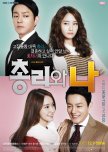
To my surprise, as the story progressed, I found the drama raising interesting questions about finding love after death, about whether simply marrying into a family makes you a part of the family. Bringing these issues to the surface drew me further into the story, as did the growing love between Prime Minister Kwon and Nam Da-jeong. Seeing them display their love through little acts of caring before they even realized the true source of their actions, how their actions stemmed from love, really warmed my heart right up.
However, all of this was abandoned in favor of contrived angst. I don't mind angst in a drama if it's well-crafted and makes sense. Prime Minister and I's angst was neither, resulting in me wanting to slap a few tear-stained faces that appeared on my screen. Wanting to strangle your heroine is not a good sign. Add to that a political plotline that I'm pretty sure was added only to show that the Prime Minister has duties other than shuffling paper around his desk, and you have the elements that sucked the joy out of what should have been a breezy viewing experience.
(Speaking of sucking out the joy of something, what the heck happened to Yoon Shi Yoon in this drama? In every scene, he looked as if someone was kicking puppies off screen. He looked happier when he was filming an actual makjang than he looks here!)
Perhaps if this drama had done a better job of mixing in the heartwarming with the angst, I would have rated this higher. As it stands, Prime Minister and I became for me an unnecessary roller-coaster of cliches and forced emotions that ultimately left me not caring at all.
Was this review helpful to you?

That pretty much sums up my viewing experience of Pretty Boy: not a particularly good drama, but one I found extremely watchable and that I anticipated each week.
The storyline is two-fold: one thread is Dokko Ma Te and the ten women he must "conquer"; the second being a drama-standard birth secret plot. I will admit that the birth secrets had me most invested and offered little surprising twists. The women storyline might seem off-putting at first, but in the end, it became less about Ma Te taking advantage of women and more about a mutual exchange and growth happening within those connections.
Where the drama started to corrode were the moments where I actually paid attention to what was going on. Those were the moments when the plotlines to nowhere, random character entrances and exits, moments of discontinuity within the story, and quick fix deus ex machinas that happen off screen and present a quick "WTF" fix to a problem became glaringly obvious.
OK, that's admittedly quite a lot wrong with the drama. However, if you're looking for a drama that will fly by quickly with light humor and mystery and a quirky comic book feel to it, Pretty Boy should hold you over until the main drama course arrives.
Was this review helpful to you?
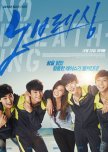
The story is not a complicated one to follow: Seo In Guk plays an orphaned teenager who once was a competitive swimmer but who quit after experiencing a trauma. This trauma left him unwilling, and perhaps unable, to enter the water. Lee Jong Suk, on the other hand, plays an Olympic-bound swimmer with the typical rich, overbearing, and distant father. Rounding out the main cast is SNSD's Kwon Yuri who doubles as the boy's mutual childhood friend and current "love interest" (in scare quotes because the romance was hollow and weak). The soundtrack of the film is most provided by Yuri, whose character is a hopeful on a Superstar K-like show, meaning that the music is bland pop-rock carried by Yuri's weak vocals. For someone in such a renowned pop group, Yuri's music moments were extremely awkward.
Acting-wise, the cast did their job well. Yuri did her best to pretend to be an actress. Lee Jong Suk was his typical angst-ridden teenager (is there a single role this kid has where he isn't moodily listening to music through oversized headphones?). Who really blew me away was Seo In Guk. Yes, his character was a little over the top, but he committed to every moment, making for a hilarious and lovable portrayal of Won Il.
As we were walking out of the theater, my friends and I all agreed that this is one movie we would watch again when released with subtitles. It was fun, a dollop of drama to add the right amount weight to the story without bogging it down, and a bit unpredictable, which is a rare thing in the wold of formulaic Korean dramas and light films. A definite watch, with or without subs.
Was this review helpful to you?
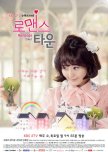
"But Romance Town doesn't have a plot!" Well, there is a plot, but it without a doubt became a secondary concern for the writer. What the writer brought to the forefront was a thoughtful (albeit at times heavy-handed) and quirky character study, and it was this slice-of-life aspect that grabbed me. The characters became so real that I found myself accurately predicting their every move, not because the plot itself was predictable, but because I came to know these characters so well in and out that guessing their next move was like friends finishing the other's sentence. More wonderful still is the grayness within each character: there is no absolute evil or good, and as a result I found myself sympathizing with even the most unlikeable resident of the street. Overall, the world of this show felt organic, with events progressing naturally based on the characters' authentic reactions as opposed to being driven by artificial plot devices.
Admittedly, the plot could have been tighter. At 20 episodes, the show is perhaps four episodes too long. There were plot points that went nowhere, towing along certain characters in its wake. Gun Woo and Soon Geum's relationship, despite being the main one, fell on the dull side, and a last minute pairing felt too sudden, but I let it slide since it was a couple I had been rooting for. Some episodes seem to just drag on (ironically enough, given the title of this drama, those were the episodes that dealt directly with romance), while others had me yanking my hair, gasping aloud, and craving more.
Despite the above complaints, I thoroughly enjoyed journeying through the world of Romance Town with the maids as my guides. We were gifted with a glimpse into their lives, friendships and loves, and I'm not ashamed to say that I miss them already.
Was this review helpful to you?
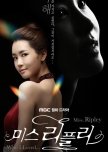
Unfortunately, I felt that as Miri's tower of lies began to falter, so did the intensity of the show. (Perhaps the story was water-downed by Miri's incessant tears?) Characters who were posed to be major threats to Miri during the first half of the show suddenly became utterly ineffectual; no doubt in my mind this is attributed to the story's emphasis on romance toward the latter half. Supposedly, it's love that will redeem Miri in the end, but I found this to be unconvincing, sappy, and a bit incongruent for a show that began with such a dark tone. However, I can't deny the power of love in this drama---it compelled nearly every male character to run with hammer and nails in hand in order to nail themselves to Miri's cross on her behalf. Scratch that: I can't deny the power of a pretty face in this drama.
A special note has to be made of the music here. Which was AWFUL. Violins of Doom; Piano of Remorse; overuse of the opera Carmen (it wasn't particularly clever the first time); funeral march played during an engagement announcement (and many other...unique...music cues); music volume overpowering the drama. This was an almost constant distraction and source of much laughter.
Give Miss Ripley a try. If you make it through the absurd coincidences and soundtrack that mars the first two/three episodes, you'll find yourself ensnared by the labyrinthine psychology of Jang Miri, cheering for her, jeering her, distrusting her, pitying her. However, be prepared for the roar to end on a whimper.
Was this review helpful to you?
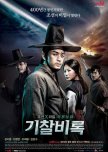
All of these elements come together in each episode to present excellent paranormal mysteries, whose threads are neatly tied up by the end of the 45 minutes while simultaneously unraveling the knit of a much larger mystery. However, to this larger mystery, the show does not offer an easy or concrete answer. Ultimately, this show is about moving away from the comfort of the known into the unknown where answers are rare and difficult to find. In the end, Secret Investigation Record leaves it to the viewer to interpret the events of the show, to find their own truth in the investigation of Inspector Kim Hyeung Do, Magistrate Jang, and Assistant Heo. It's a challenging watch, but the questions raised and the conversations sparked are well worth it.
Was this review helpful to you?
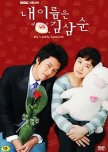
Was this review helpful to you?
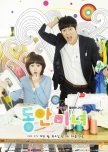
Story: I gave this a 6 for story instead of the intended 5 because the story is what initially drew me to BFB. Age is an intrinsic part of how Koreans socialize with one another through their actions and communication. And so it was interesting to watch a 34 year old designer-wannabe struggle to play the role of the complacent youngster who's just a tad bit too opinionated when drunk. However, and this might be just cultural difference talking, her deference bordered on aggravating spinelessness. It didn't help that her immediate environment is populated with the most unlikeable people I've ever encountered both fictionally and non. These people were spiteful for the sake of spitefulness, including her own family, and although some characters are redeemed towards the end, I needed to tap into my reserve of perseverance to endure that long. The story towards the end begins to flag, hitting a rut in which actual narrative tension is replaced with design contest after contest after contest. This might have had to do with the extension given to BFB: it also seemed that during this extension the writer remembered that there was supposed to be a romance, and so decided to throw in as many rom-com cliches as possible to satisfy that aspect of the show. The extension did this show no favors.
Acting/Cast: Really, this rating belongs to Daniel Choi. This show belongs to Daniel Choi. This goofy smile that spread across my face every time he was onscreen belongs to Daniel Choi. My heart belongs to Daniel Choi. The number one reason why I didn't drop Baby-faced Beauty was because I couldn't bear to drop Daniel Choi, who was delightfully immature yet sincere as Choi Jin Wook.
Overall: I wouldn't say that this drama is bad, and there were many moments that I thought were downright great. I finished the last episode with a smile on my face and the happy warmth that usually indicates my love for a show. However, taking into account the MANY times I wanted to give up on this show and how I had to force myself to trudge through for just one more hit of Daniel Choi, the best I can say is that Baby-faced Beauty for me was just watchable.
Was this review helpful to you?
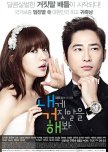
Those who love this drama praise the chemistry between the leads Kang Ji Hwan and Yoon Eun Hye, and even I can't deny that the chemistry between the two was so palpable that it overwhelmed me at times. However, sizzling chemistry does not a good relationship make, and I found nothing compelling about the love between the characters Hyun Gi Joon and Gong Ah Jung. It seemed to consistently coast on a superficial level, especially towards the end when the two just go on cute dates all the time and exchange grating "I miss you sooo muuuuch"'s.
When the relationship takes a last minute dive into depth, I found it to be forced and insincere. That's not the actors' fault. Kang Ji Hwan is terrific, and Yoon Eun Hye is good enough, although I maintain that she's at her best when she's crying (I don't think there's an actress who can cry like Yoon Eun Hye, and she really gets to show off here). Unfortunately, they fell victim to a poor script. Yes, the show switched writers half-way through the series, which accounts for some flaws. However, during the reign of the second writer, the plot was riddled with holes, characters acted without any logic or consistency or they were entirely neglected. There's a secondary story line concerning Ah Jung's father that goes nowhere and adds nothing to the overall story, and the second leads are given such throw away and meaningless resolutions that I can't help but think that the show would have been better off if Sang Hee and Yoon Joo had not been introduced to begin with.
I'm not going to warn you to not watch this drama. Lie to Me has a fervent following, and so clearly there's something here that some drama fans passionately latched on to, and you just might be able to find out what that something is. As for me, I'll just have to declare this a missed connection.
Was this review helpful to you?
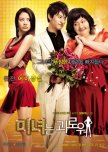
I'm always a bit weary of movies that play with the whole fat-to-skinny dynamic since they tend to lazily default to tasteless jokes around how disgusting and lazy overweight people are. To this movie's credit, apart from one awkward joke in the beginning, it navigated around that tension well, finding humor in both Hanna's post and pre-surgery appearance and focusing more on the absurd reactions of those around her as opposed to making her the butt of the jokes. Well done, film.
Where this movie lost me was in the writing and the characterization. The plot barely has such a haphazard framework that the scenes seemed to be just random occurrences with barely any connection between them. Worse, the characters were extremely 2-D. The main antagonist barely has any screen time, and her machinations occur off screen so tension never really develops between her and our heroine. In fact, she's not even the catalyst for the movie's climax: why have an antagonist at all? As for the main love interest... Well, don't watch this if you're looking for a love story. His flat performance and inability to garner any sympathy would have ruined it for you anyway.
The exception to the above is main actress Kim Ah Jung, who perfectly captured the artificiality and fragility of "plastic" women that I found myself wincing and worrying that her nose would just pop off mid-line. Her singing voice is also beautiful and saved the terrible Korean covers of various English songs from being too torturous to my ears. I expected better from a movie set in the music world. Unfortunately, Kim Jung Ah could not escape the terrible script, and her character also suffers from 2-dimensionality. I had no idea that she was suffering an identity crisis until the climax, and because of that, the ending seemed forced, insincere, and just plain cheesy. Once again, honest words and tears smooths over all problems, believability be darned.
I do think 200 Pounds Beauty had the potential to be a good film if it had more weight to it. There were laugh out loud moments, but there could have been more, especially given the unexpected dark turn the movie took toward the end. A drama adaptation, in which characters and back stories are explored in more depth, would be more than welcomed on my part in the perhaps misguided hope that this story can be done justice.
Was this review helpful to you?
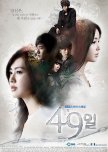
What I found most compelling was the friendship between Shin Ji Hyun and Song Yi Kyung, which placed the romances on the back burner for me. Granted, I\'\'m new to the K-Drama scene, so there might be plenty of dramas that depict such a beautiful relationship between women. However, 49 Days was my first encounter of such a thing, and I became emotionally involved in how Ji Hyun comes to care for her unsuspecting host, and how Yi Kyung in turn grows to care for her unexpected friend. The way these two help to bring closure to each other was a joy for me to watch.
The soundtrack also both perfectly captures and amplifies the mood of the series, especially Jung Il Woo\'\'s contribution entitled \"Scarecrow\". The story, based on a somewhat esoteric bit of Buddhist after-life theory, is original, extremely well written, and perfectly paced so that the story is constantly progressing and never stagnating over some little plot point. There has been much griping about the ending, and although there are clues clumsily given in the later episodes, I understand how some find the ending unexpected. However, this drama never billed itself as a light drama or as a romantic comedy, so I think it\'\'s a bit disingenuous to claim that the ending hoodwinks the audience. I was unsatisfied with one unnecessary storyline that was introduced, and instantly wrapped up, in the last episode, hence the 9 for story. Overall, despite centering around death, this is one of the most life-affirming dramas I have seen. It might be a bit premature, but this drama has my vote for one of the best in 2011.
Was this review helpful to you?
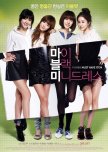
After the climactic fall out between the friends, Yoo Min (Yoon Eun Hye) reveals to Min Hee (Yoo In Na) that she doesn\'\'t know her friends as well as she thought she did. The same can be said for this film: it tries too hard to be Sex and the City, Sisterhood of the Traveling Pants, and The Devil Wears Prada, and ends up sacrificing its own identity. Despite its best efforts, it fails to capture either the life wisdom of SATC, the magic of Sisterhood, and the sympathy of Devil.
Supposedly it\'\'s the friendship among the four women that helps them to weather the storm of conflict. However, I found that friendship to be lacking. The first time we see all four together is at a club where they surround a table of drinks and proceed to bet on whether or not Hye Jin (Park Han Byul) will successfully bed a fellow club-goer. Other than that, the story follows the girls individually, reuniting them for a blow-out argument and then at the end for a rather unconvincing resolution. Apart from shopping and clubbing, the movie gives us no insight into why these four are friends to begin with, and without that, I found myself not caring whether or not they remained friends.
The story is ordinary. The acting is okay (I\'\'m beginning to think that Yoo In Na has fallen into the bubbly, airhead typecast). I can\'\'t recall a single song from this movie. Basically, this is a formula chick flick, written and acted by the book. For a chick flick to resonate with me, it doesn\'\'t have to be unique or clever, but it has to have heart; it has to make me feel something. This one is as empty and shallow as the four friends.
Was this review helpful to you?
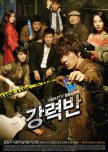
Was this review helpful to you?

Comparing the start to the finish, this felt like two dramas stitched together to create the Frankenstein monster dubbed Rebound. What starts off as a typical tale about a woman's struggle with her weight and her search to find love ends up as a story about taking responsibility for your own dreams and happiness. Neither story was done in any groundbreaking way, both falling into the common cliches of either trope. One specific plot point, the diet pills, might have been interesting if better utilized; however, in the end it proved to be a red herring, much to the story's loss. The story felt as if it lacked cohesion, and as a result, the characters seem to constantly revolve around the same arguments with any progression feeling quite sudden. When the angst reared its head, the over-exaggerated acting on display from the main leads would often take me out of the moment, making me well aware that I was watching actors "acting", and badly at that.
Despite the flaws of this drama, I still enjoyed my viewing experience. There were a few laugh out loud moments per episode, and I did become attached to the heroine Nobuko, even though she was a walking cliche (the Jolly Fatty). Her character was nicely fleshed out with little endearing quirks that made her pop, and I found myself cheering her on despite myself. The absurd ending almost bumped this one down to a 4. However, I admit that I looked forward to each episode, if only to drool over the cakes on display. The offbeat (if loose) story and the gratuitous food porn bump this up to a 5 for me.
Was this review helpful to you?

Was this review helpful to you?























